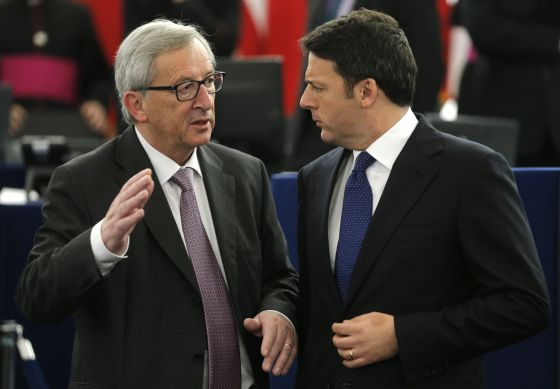
President of the European Commission, Jean-Claude Juncker, left, talks with Prime Minister Italian, Matteo Renzi / Christian Hartmann (AP)
The financial engineering plunged the world into serious trouble seven years ago, and Europe now tries to circumvent the crisis with another round of financial engineering, this time constructively to strengthen its sluggish recovery. Brussels yesterday confirmed that use of the European budget 16,000 million and 5,000 million from the European Investment Bank to cement Juncker Fund, an investment plan that hopes to raise money on the markets and the private sector to reach 315,000 million in energy and transport infrastructure in the digital agenda and through SMEs. The European Commission estimates the macroeconomic impact of that plan between 2.5% and 3.1% of GDP in the next three years, with the creation of 3.3 million jobs by 2017 if things go well.
“The plan has the maximum possible resources in view of political consensus and the legacy left by the crisis. And can work if the markets believe helps clarify the horizon, if investors see clear projects, and whenever the ECB also do your part to overcome the risk of a secular stagnation “explained one of the team members Juncker at the time that the pope Francisco gave his speech in Parliament. Francisco did not cite in Strasbourg the parable of the multiplication of the loaves and fishes. But maybe that’s the right metaphor to describe the European plan to find the missing piece of the puzzle out of the crisis. Investment
Who puts money
The multiplier
The financial accelerator is one of the great discoveries of this crisis. It worked when he broke the hurricane: the degree of leverage of financial institutions multiplied losses. Brussels seeks now to work in reverse: calculates a multiplier 1:15 and ensures that this estimate is “prudent”, “based on historical experience” in previous financial programs of the EU. But it will be different in each case. Investments will be selected by criteria of viability: no country shares or by sector and decision making avoid at all costs the political criteria to ensure maximum support of the private sector
Why this. Once you?
It was a similar plan in 2012 that did not work. The Commission believes that this time is different: first, the euro no longer going through an existential crisis; on the other, there are large numbers of private savings in the world that do not invest in Europe for fear that things go wrong. “The plan follows a clear philosophy: he wants to use the available liquidity and low interest rates environment. We want to stimulate investor appetite for the promoters of this type of infrastructure “, according to European sources. “Running with the first losses distrust of private sector contracts,” “but it would be naive to believe that a simple answer will solve all the problems.” “Europe needs more: this is a drop in the ocean” close
What else is needed
In a word:.? Grow. The ECB chief Mario Draghi calls for it a less tight fiscal policy reforms and investments, and promises to make efforts to monetary policy, probably with a purchase plan large-scale debt in 2015. Juncker puts their bit with the investment. France and Italy prepared reforms. Brussels given a slap on those countries by the serious risks of breaching its deficit targets but will not take drastic measures: fiscal policy will not harden. The investment plan also has tax side effects: Member States can add to the guarantees; “That does not count as deficit,” says the Commission.
No comments:
Post a Comment